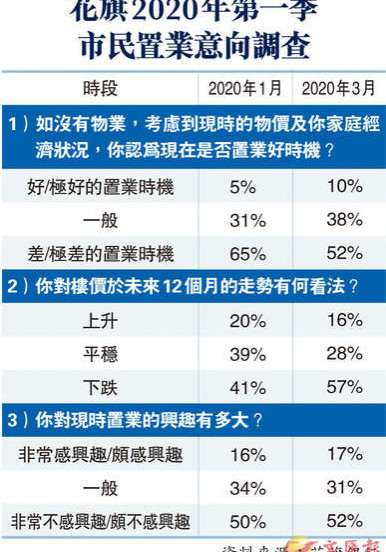(Journalist Ngan Lun-Lok)
It had been the peak of the COVID-19 epidemic in the first quarter this year. Did the public's views on housing change in that quarter? Citibank yesterday released a survey on the public's intention to purchase property in the first quarter of 2020, showing that as many as 57% of the respondents in the quarter expected that property prices would fall in the next one year. But those who think that the current is right/perfect time to buy a home only account for 10%, double that before the epidemic. And the proportion of people who believe it is time to enter the market is the highest in the past nine years.
Citibank surveyed the impact of the COVID-19 epidemic on people's homeownership intentions in the first quarter of 2020 and discussed their attitudes towards homeownership before and during the outbreak. According to the survey results, during the epidemic, respondents who believe that property prices in Hong Kong would fall in the next 12 months accounted for 57%, higher 15% than that before the epidemic. It reflects the percentage of respondents who are pessimistic on property market outlook increases. The respondents who estimated the family financial situation to deteriorate in the next year were 24%, double that in the same period last year.
The epidemic impact may be smaller than that of SARS.
Although people look down the property market outlook, and there were still 52% of respondents in January and March 2020 believing that it is a poor / the worst time to buy a property, the number during the epidemic in March had fallen by 13% than that before the outbreak in January. Respondents who considered the current is a good/excellent opportunity to buy a house accounted for 10%, doubled compared with that before the epidemic. The proportion of people who believe that it is time to enter the market is the highest in the past nine years.
The survey also takes the 10% drop in property prices during the SARS outbreak in 2003 as a reference, interviewing respondents' views on the property market trend during the epidemic. The results show that the respondents expecting property prices in median decline from the beginning of the year to the end of this year account for 7.5%, with a largest expected decline at 10%, reflecting that they believe the impact on the property market of COVID-19 would be smaller than that of the SARS in 2003.
Owners wait and see and do not eager to sell houses.
During the epidemic in March, only 6.1% of the respondents were willing to reduce their prices by 10% or more to sell the property, reflecting that owners were quite calm during the epidemic. There was no sign of rushing to sell in a situation that house prices were widely expected to fall.
However, during the epidemic in March 2020, 52% of respondents were very uninterested / not interested in buying property, and 17% were very interested / very interested in housing, similar to the numbers before the epidemic. Above reflects no change in respondents' desire to buy a home during the epidemic. The above results show that, under the global COVID-19 epidemic, the respondents look good to housing prospects but still are worried about property prices falling and future financial conditions. The interest in home purchases of the overall respondents is small.
The Executive of Retail Banking of Citibank, Lee Kwai-Chong expresses that the respondents' intention to purchase property before and during the outbreak was stable. Owners were temporarily calm facing the epidemic and did not rush to sell houses at low prices, perhaps because they had experienced the test of the SARS outbreak. It reflects that the epidemic has not brought too much impact on the respondents' home purchase or sales plans. Respondents still hold a wait-and-see attitude towards the property market prospect.

